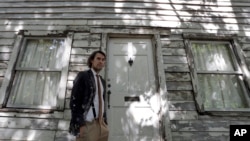Section by section, American artist Ryan Mendoza painstakingly disassembled the small wood-frame home of civil rights icon Rosa Parks after learning that the struggling city of Detroit was going to have it demolished. He shipped it across the Atlantic Ocean and rebuilt it in the German capital of Berlin, saving the home and creating a new tourist attraction.
The house has been up in Berlin less than a year, but after violence at a white nationalist rally in Charlottesville, Virginia, and the growing call to remove Confederate monuments in the United States, the New York native said it's now clear to him that Parks' house needs to return soon to the U.S.
"It's actually become a necessity, as we see people rising up and seeing things for what they are," he said. "As Americans begin to understand they have to re-contextualize these monuments, the Confederate statues, there is a lack of civil rights monuments to balance things out."
Parks, who died in 2005, became a leading name in the civil rights movement for refusing in 1955 to give up her seat on a bus to a white passenger in Montgomery, Alabama. She moved to Detroit in 1957 to escape death threats and stayed in the house with her brother and his family — crammed into the tiny residence with more than 15 people.
After the financial crisis of 2008 and Detroit's dramatic decline, Parks' home was abandoned and put on a list for demolition. Parks' niece Rhea McCauley instead bought it from the city for $500 and donated it to Mendoza for preservation. In 2016, he and others took it carefully apart, then rebuilt it on the lot in Berlin where his studio and home are.
Queen Yahna, a soul and gospel singer from Philadelphia who now lives in Berlin, performed for the crowd at the house's official dedication in April. Visiting the house this week, she said it doesn't matter to her where the house is, so long as Parks' struggle is remembered.
"The issue of racism is going on, negative things are going on and there are different things, positive, that can be brought to light, not just physical monuments," she said. "The spirit is more important."
But Mendoza said even though the house is tucked away on his lot, it still draws curious onlookers daily — including many Americans — showing how important a symbol it is.
"Imagine if the house were on a public setting in a prominent city in the U.S.?" he said. "That's an educational tool that shouldn't be denied the American people. They have to know their past."
He said a foundation has offered to help pay the costs of moving it back to the U.S., and he's been in talks with museums and a university about putting it on display, but there's no timeline yet on when the house may return.
His dream would be to see the derelict home reconstructed on the lawn of the White House with the blessing of U.S. President Donald Trump.
"Trump says that he's not a racist. This would be a wonderful moment for him to redeem himself in the eyes of Americans," Mendoza said. "He wants to embrace all of America's past. Why not embrace the house that Rosa Parks once lived in?"
McCauley, Parks' niece who still lives in Detroit, told The Associated Press that she would welcome the home's return to the U.S.
"We need all the help we can get, in light of all current events," she said.




